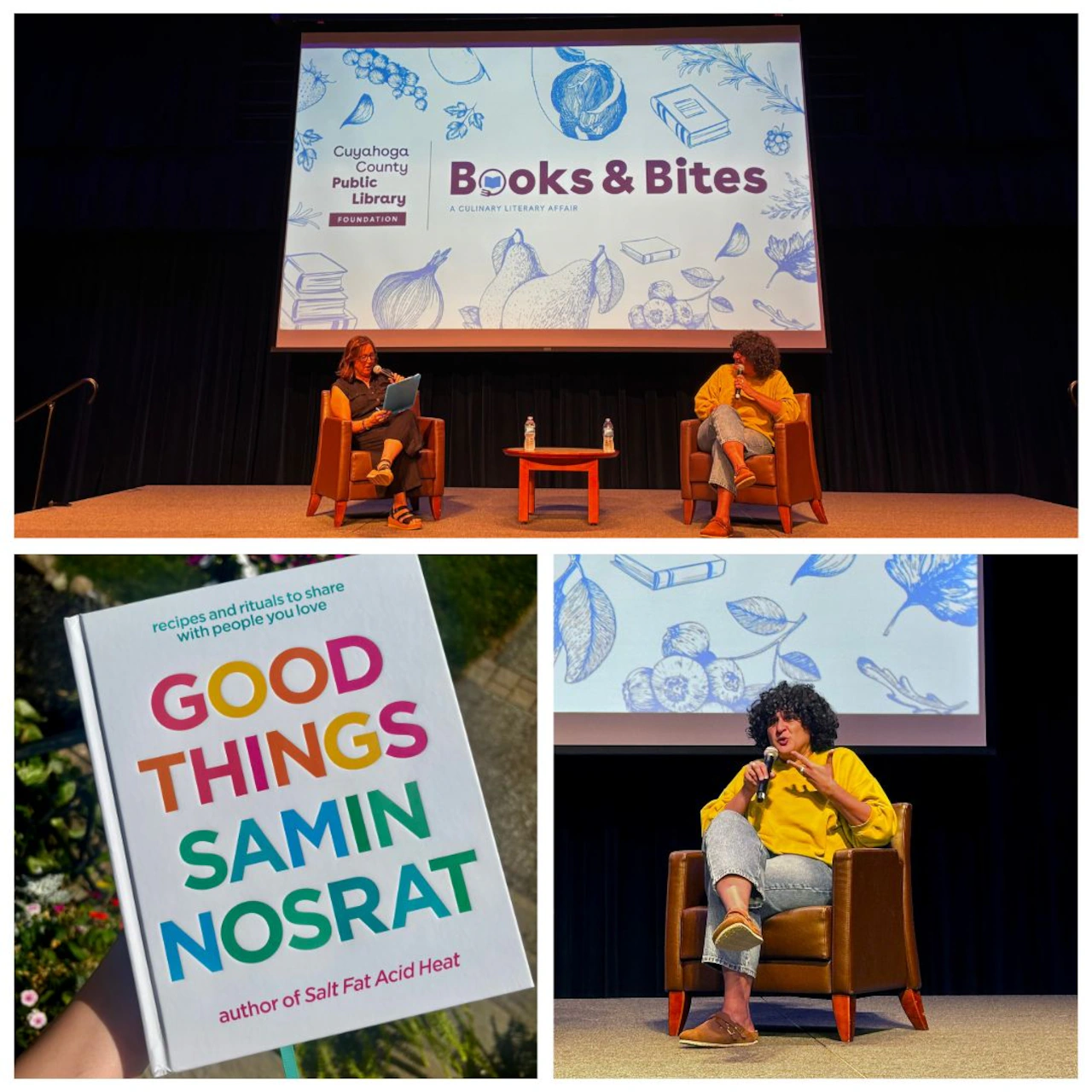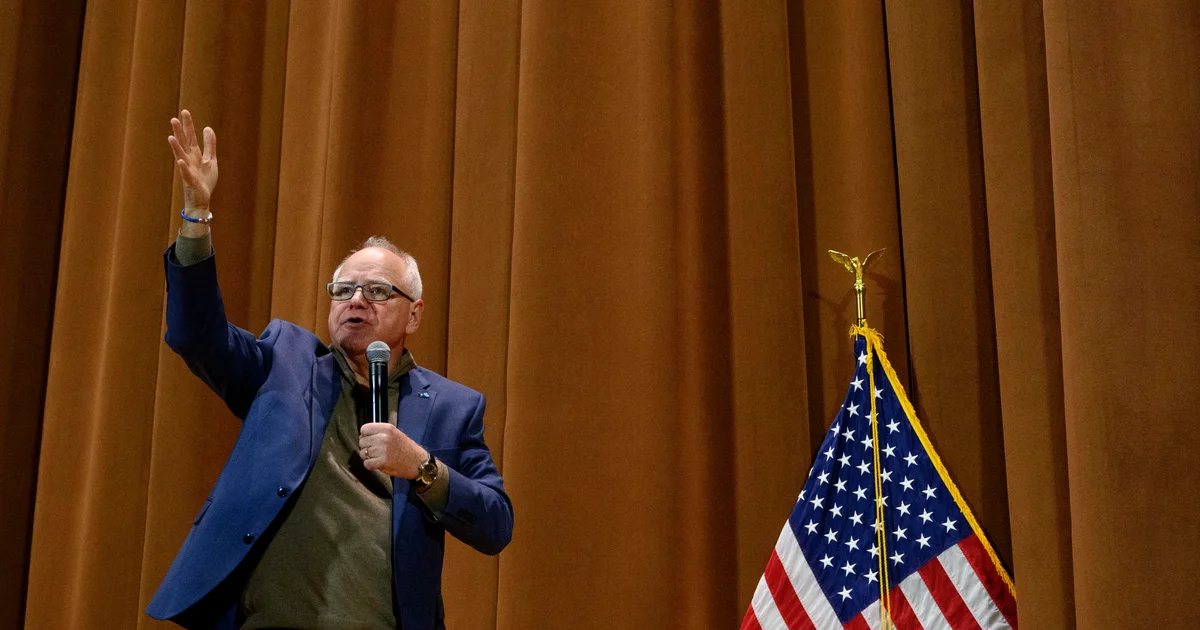
PARMA, Ohio — It’s a nearly universal experience for home cooks to feel overwhelmed when hosting a dinner party.
The foodie of the family or friend group has a reputation — whether real or perceived — to deliver their best. They want to procure the best ingredients, create an elaborate table setting, make every dish from scratch and never let a guest lift a finger. I’m not judging — that’s me during any holiday or weeknight dinner party.
Samin Nosrat, the James Beard Award-winning author of “Salt, Fat, Acid, Heat,” can relate. The chef, podcast host and star of the Netflix adaptation of her book feels like she spent most of her life seeking perfection and achievement, whether she knew it or not. Once she was a best-selling author and, according to Time Magazine, one of the most influential people of 2019, she thought she’d feel a sense of accomplishment.
“I was left with this feeling of loneliness and sadness inside,” she said during her Sunday, Sept. 21 appearance at the Parma-Snow Branch of the Cuyahoga County Public Library.
That’s why Nosrat focused on rituals, building community and not sweating the small stuff with her second book, “Good Things: Recipes and Rituals to Share with People You Love,” which released Sept. 16. Nosrat’s event in Northeast Ohio part of her ongoing promotion tour for the book and the library’s Books & Bites series, which benefits the Cuyahoga County Public Library Foundation.
Stories by Alex Darus
How to celebrate Negroni Week at Greater Cleveland bars — and at home
CentroVilla25: How a Latino market is transforming Cleveland’s Clark-Fulton neighborhood
Patron Saint, Betts team up for end-of-summer patio party in Cleveland
Lisa Sands, the host of the CLE Foodcast, moderated the sold-out event on Sunday afternoon. Nosrat discussed the “long path to make something honest and meaningful” with her second book, which came eight years after her groundbreaking debut.
“I felt very disconnected from cooking in the last several years,” Nosrat said. Due to her “unconscious” need for perfection, she often felt herself uninspired to cook anything at all. After all, she achieved every dream she could’ve imagined with her debut cookbook — did she have anything else to say?
She also made it clear in “Salt, Fat, Acid, Heat” — a book centered on technique and in-depth food knowledge — that she had no interest in writing a standard recipe book. That is, until she started looking at recipes as rituals.
Since the four-part “Salt, Fat, Acid, Heat” series debuted on Netflix in 2018, Nosrat found herself in a dark place. She didn’t feel the sense of accomplishment she expected by achieving her wildest dreams. The COVID-19 pandemic made her feel more isolated than ever. Her estranged father’s intense health battle and untimely death left her feeling emotionally paralyzed. Yet, she still had a book deal to meet.
In what she called the lowest moment in her clinical depression, a friend invited her over for dinner on a Monday night. It became routine — the same crew of people kept showing up at the same house, at the same time, every Monday night for dinner. Now, they’ve been doing it for five years.
“I just knew I had to keep going there,” she said of those early dinners when she didn’t know what else to do.
Growing up in a Persian immigrant household, she was taught never to go to a person’s house empty-handed. But at the beginning of the Monday dinner tradition, she just showed up and let people take care of her.
“I didn’t have to earn my seat at the table,” she said.
The weekly gathering not only helped her build a sense of community she’d been longing for but also taught her about sharing responsibility and letting go of expectations. Sometimes one person cooks for everyone, or it’s a potluck vibe. One attendee has developed a habit of packing the leftovers each week. They even order pizza.
“For months, I just thought they were doing me a favor,” she joked of her friends having her over regularly. But she realized it was a point of connection for all of them.
“It took us awhile to realize we were doing this thing unintentionally.”
“Good Things” taught Nosrat a lot, including how to get out of her own way. She realized she didn’t have to make a cookbook that reinvented the wheel. Her recipes didn’t have to yield exact results from every home chef who tried them.
Sure, she wants the dish to be delicious, but varying factors like pots and pans, stoves and ovens, brands of ingredients and even elevation can impact a recipe. The goal is to make something delicious and help a home chef feel more confident.
“I can’t make it look like the picture” she laughed.
While “Good Things” is filled with plenty of straightforward cooking instructions, it’s more of a guidebook with tried-and-true recipes and ideas. Nosrat emphasizes how people approach cooking, focusing on what will be more useful.
Some recipes, like desserts, have the traditional setup with precise measurements and temperatures. Others are looser, like toasting bread in olive oil or creating tree diagrams for building salads.
“I did my best to give the information that served each recipe,” Nosrat said.
The vegetable chapter is the lengthiest in the book, and it’s no surprise that it took Nosrat two years to complete the single section. It’s organized seasonally, starting with spring, and then alphabetically. Each section discusses Nosrat’s favorite ways of cooking each vegetable alongside other recipes, often combining dishes or condiments in the book.
Speaking of condiments, “Good Things” has a whole section on stocking your pantry. Nosrat believes in having a few easy things on hand to make throwing a delicious meal together that much easier. Some of the recipes are quick, like fried shallots for topping soups and pastas, while others, like preserved Meyer lemon paste, are a lesson in patience.



